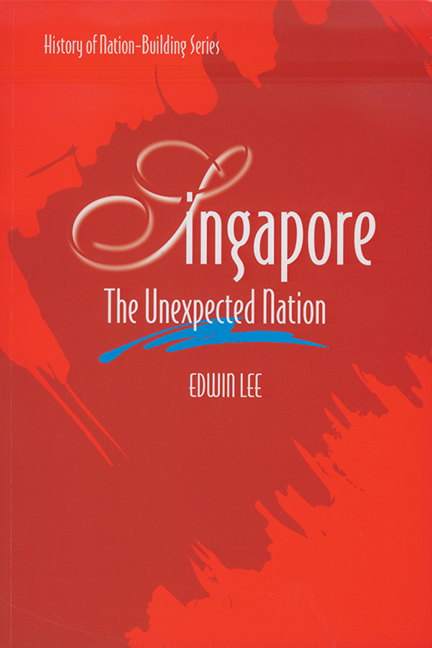Book contents
- Frontmatter
- Dedication
- Contents
- Preface
- Introduction by Wang Gungwu
- Chapter One Beginnings: From Temasek to Singapore
- Chapter Two Race, History and Nationalism
- Chapter Three Contestants and Contesting Visions
- Chapter Four The Accidental Chief Minister
- Chapter Five The Terminal Chief Minister
- Chapter Six The Embattled Prime Minister
- Chapter Seven Merger: Contesting Ownership and Principles
- Chapter Eight Terms of Disendearment
- Chapter Nine Dare to be Equal
- Chapter Ten The Way to Survive
- Chapter Eleven National Service: The Price of Independence
- Chapter Twelve Politics of Education
- Chapter Thirteen Home Ownership, National Stability and the New Middle Classes
- Chapter Fourteen University and Nation
- Chapter Fifteen Toh's Nation-Building Thrust
- Chapter Sixteen Nantah: Between Community and Nation
- Chapter Seventeen Self-Renewal: Talents for a Tough Act
- Chapter Eighteen The Consensual Prime Minister
- Chapter Nineteen Confucianism, Christianity, Chineseness
- Chapter Twenty Singapore Dreams, Singapore Dilemmas
- Chapter Twenty-One The Hyphenated Singaporean
- Chapter Twenty-Two The Unexpected Nation
- Bibliographical Note
- Index
- The Author
Chapter Eighteen - The Consensual Prime Minister
Published online by Cambridge University Press: 21 October 2015
- Frontmatter
- Dedication
- Contents
- Preface
- Introduction by Wang Gungwu
- Chapter One Beginnings: From Temasek to Singapore
- Chapter Two Race, History and Nationalism
- Chapter Three Contestants and Contesting Visions
- Chapter Four The Accidental Chief Minister
- Chapter Five The Terminal Chief Minister
- Chapter Six The Embattled Prime Minister
- Chapter Seven Merger: Contesting Ownership and Principles
- Chapter Eight Terms of Disendearment
- Chapter Nine Dare to be Equal
- Chapter Ten The Way to Survive
- Chapter Eleven National Service: The Price of Independence
- Chapter Twelve Politics of Education
- Chapter Thirteen Home Ownership, National Stability and the New Middle Classes
- Chapter Fourteen University and Nation
- Chapter Fifteen Toh's Nation-Building Thrust
- Chapter Sixteen Nantah: Between Community and Nation
- Chapter Seventeen Self-Renewal: Talents for a Tough Act
- Chapter Eighteen The Consensual Prime Minister
- Chapter Nineteen Confucianism, Christianity, Chineseness
- Chapter Twenty Singapore Dreams, Singapore Dilemmas
- Chapter Twenty-One The Hyphenated Singaporean
- Chapter Twenty-Two The Unexpected Nation
- Bibliographical Note
- Index
- The Author
Summary
For much of Goh Chok Tong's time as leader, the sun shone brightly. After a brief recession, when he was deputy prime minister, the sun was back with him again, waxing even more strongly as he went on to become prime minister, its brilliance undimmed until the later years when dark clouds once more threatened.
This success created a new, prosperous, educated middle class. The members of this class included the post-war baby boomer generation who had known a city state of stark contrasts between wealth and poverty, elegance and squalor in the colonial era, and the early independence years. Their children would have grown up knowing nothing but the affluence and the seemingly endless boom since that time.
Goh's job was to lead the baby boomer generation and their progeny into the next lap of nation-building. He meant to lead them to qualitative improvement. The next lap must make everything even better: education, employment, health care, housing, culture, and the arts. A younger generation of Singaporeans, Goh said, could transform Singapore all over again. They could make it the best home to be in.
This visionary picture of Singapore must be set against the Singaporean reality. The reality was that Singaporeans shared the same home but had different dreams. Behind these different dreams were the old enduring loyalties of race, language, culture, and religion. The upshot was that Singaporeans viewed success not as one people, but as one group of people in comparison with another. The Malays compared themselves with the Chinese. Even among the Chinese, there was comparison as the Chinese-educated measured themselves against the English-educated: they were of the same race but educated in different languages, schools, and universities in the same country.
As Singapore entered a more affluent era, the tendency to compare and keep up with one's ethnic neighbour or English-educated counterpart hotted up even more, and the sense of frustration and marginalization of those left behind grew more acute.
For the more affluent society was also more competitive and meritocratic. Everybody had moved forward, but not at the same pace. The Englisheducated moved fastest. This was true not only of the Chinese, but of the Malays, Indians, and Eurasians too who had acquired an education in English. They had a better chance to rise to the top. The Chinese who were educated in Chinese had far less mobility.
- Type
- Chapter
- Information
- SingaporeThe Unexpected Nation, pp. 487 - 532Publisher: ISEAS–Yusof Ishak InstitutePrint publication year: 2008

